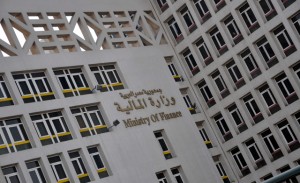
(DNE File Photo)
Egypt’s budget deficit recorded EGP 89.4bn in the first half of the 2013/2014 fiscal year, representing 4.4% of annual GDP, the Ministry of Finance’s monthly report showed.
The interim government had announced in August that it was aiming to reduce the budget deficit to 10% of GDP by the end of the current fiscal year, a reduction from the 14% budget gap of the 2012/2013 fiscal year.
Prior to this announcement, a report from the Ministry of Finance issued in July said that the budget deficit will decline to 9.1% during the current fiscal year, reaching approximately EGP 186bn from EGP 204.9bn in the previous fiscal year.
On 28 January, Minister of Finance Ahmed Galal said the budget deficit is expected to be reduced to 9.5% in the 2014/2015 fiscal year, and to 8% within the coming three years.
Between July and December, the total value of revenues reached EGP 175.4bn and total expenditure registered EGP 262bn. In this period, tax revenues registered 5.1% of GDP and non-tax revenues amounted to 3.5%.
In January, Galal said the government is seeking to boost tax revenues to represent 25% of GDP in the coming years, an increase from the current 15%.
The total revenue in the 2013/2014 fiscal year is expected to reach EGP 505.5bn, with tax revenues amounting to EGP 358.7bn, non-tax revenues totaling EGP 146.8bn and other revenues to reach EGP 144.4bn.
Total expenditure is expected to reach EGP 689.3bn, EGP 171.2bn of which will be
allocated for wages and workers’ compensation, the ministry said in July.
Following the ouster of former president Mohamed Morsi in July, the interim government decided to adopt a new expansionary fiscal policy to support the economy.
According to the recent report, the government’s economic strategy depended on “fresh injections of resources from abroad,” in reference to the financial assistance pumped into Egypt from Gulf countries, which amounted to $12bn in total.
The strategy also focused on stimulating the economy through public investments in the infrastructure sector. The interim government adopted two stimulus packages after it came to power in July. The first package, announced in August, was valued at EGP 29.6bn,and the second, announced in January, totalled EGP 30bn.
The government is financing its two stimulus packages through a $9bn deposit in the Central Bank of Egypt, which had previously remained unused since the 1990s.
Galal pointed out in January that the government has spent EGP 18bn from the first stimulus package.
Rationalising expenditure by “removing major distortions such as energy subsidies” was another strategy adopted by the government. However, the report said that the saved expenditures will be reallocated “in favour of social justice”.
The Ministry of Finance stated in July that the 2013/2014 fiscal year budget aims to rationalise the expenditure of the energy subsidies, “which serves the high income class more than the low-income citizens”.
Energy subsidies currently comprise EGP 128bn of the state’s budget, according to the Ministry of Petroleum.
“We don’t spend money on projects we don’t have resources for,” Galal said earlier in December in response to queries on how the government would reduce its budget deficit while simultaneously announcing new stimulus projects.
In the first quarter of the current fiscal year, economic growth rate registered 1.5%, which Galal said was “lower than [his] expectations”.



